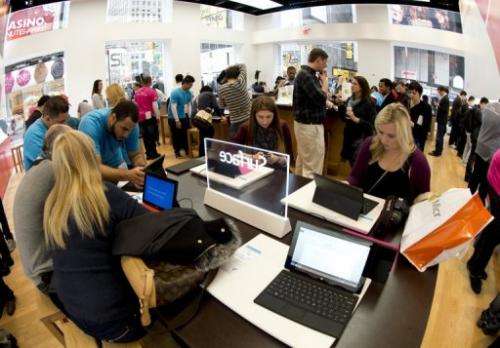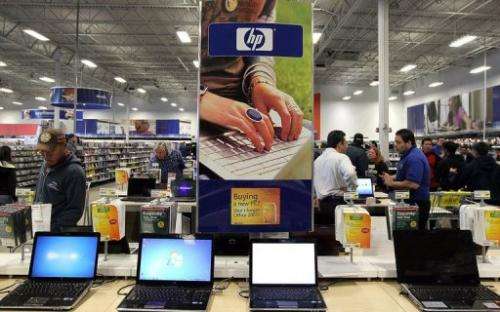Mobile Internet forcing computers to evolve

The shift to smartphones and tablets became a landslide this year, crushing desire for laptop computers and pressuring manufacturers to adapt to the mobile Internet era.
The trend promised to gain momentum in 2013, with people using handheld gadgets to remain connected to the Web on the go and switching to sophisticated systems in homes or offices.
"Tablets will not kill PCs (personal computers)," Forrester Research analyst Frank Gillett told AFP. "Tablets will force them to evolve."
Signs that the evolution is underway include Microsoft overhauling Windows to synch the world's most widely used computer operating system with tablets and smartphones as well as desktops and laptops.
Microsoft is even selling its own Surface tablet based on the Windows 8 software released in October.
"I don't think the PC is going away," said analyst Rob Enderle of Enderle Group in Silicon Valley.
"What is clear is we are going through some turmoil; the market is resetting itself around new products."
While people opt for tablets instead of laptops for computing on the move, they will yearn for bigger screens and more processing power when they settle down for "real work," according to analysts.
"Your tablet can do so much that fewer people need laptops, but when you get to your desktop you want something that contrasts significantly from your tablet," Gillett said.
"I think we will ultimately see the reinvention of PCs."

Gillett described a future in which people go seamlessly from working on mobile devices to desktop stations where tablets can be docked and augmented with sensors, processors, bigger screens and more.
He refers to the concept as "frames" for computing.
The analyst contends that the limping economy is among factors behind a temporary lull in PC purchases destined to end as people "go through this illusion they will do it all on a tablet and realize they can't."
"Tablets will substitute for some, even many, laptops but because a tablet can't do as much as a laptop it will eventually stimulate PC sales," Gillett reasoned.
"What ultimately happens here is that the laptop and desktop get rethought and re-invented for a tablet world."
The market for tablets and smartphones is red-hot, leaving the PC as an afterthought for many. Microsoft, which was the biggest tech firm in 2009 because of its dominant Windows operating system for PCs, has fallen behind Apple and is struggling to remain a major force amid gains by Google and Amazon.
Onetime giants like Hewlett-Packard and Dell are struggling amid sluggish demand as sales of tablet computers and other devices surge.
However, Enderle pointed out, China-based Lenovo is thriving by selling the gamut of computing devices.

"Lenovo is showing success in all categories, supporting the notion that while the market has more products it is all still personal computing," Enderle said.
"Before we were buying a laptop or desktop computer," he continued. "Now, we are increasingly carrying many products."
Research firm IDC projects global PC sales this year of 367 million, up just a fraction of a percent from 2011 and marking the second consecutive year of growth below two percent. ABI Research predicts tablet computers will overtake notebook PCs by 2016.
Roger Kay of Endpoint Technologies Associates said that the PC "still is pretty relevant" but "not the center of the computing universe."
"I think people are going to choose a pantheon of devices, and all of these are connected through the cloud... so the user is now the center of the tech universe."
More than 32 million tablets were shipped worldwide in the third quarter of 2012, a 75 percent increase from the same period a year earlier, according to Futuresource Consulting.
Futuresource projected that global tablet shipments this year would hit 137 million units and nearly triple during the coming five years.
"We're seeing significant industry growth across all key world territories, with the majority of tablet market activity still originating from consumer purchases," said Simon Bryant of Futuresource.
Part of the success of tablets was attributed to the average price dropping below $400, due in large part to competition between device makers using free Android operating software from Google.
"Tablets continue to captivate consumers," said Tom Mainelli, research director for tablets at IDC.
(c) 2012 AFP





















